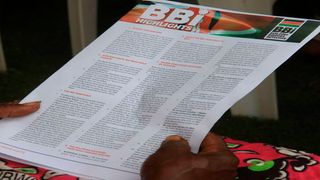
A copy of the Building Bridges Initiative (BBI) report.
| File | Nation Media GroupPolitics
Premium
Boundaries row: ‘Move to usurp IEBC illegal’
What you need to know:
- Members of the joint Justice and Legal Affair Committee have warned against creation of new constituencies.
- The proposed zones, spread over 28 counties, will bring the total number of constituencies to 360 in the country.
The proposal to create 70 new constituencies through the Building Bridges Initiative (BBI) constitutional change drive has run into a new hurdle.
On Sunday, the question of whether the new voting areas should apply in the 2022 General Election emerged as a possible legal minefield that could hit the Constitution of Kenya (Amendment) Bill, 2020, should it be approved in a referendum.
The proposed zones, spread over 28 counties, will bring the total number of constituencies to 360 in the country.
Densely populated counties are the biggest beneficiaries, with Nairobi getting 10 new constituencies, Kiambu (six), Nakuru (five) and Kilifi (four).
Close to 20 counties in arid and semi-arid areas will not receive a new constituency.
More on this: Nairobi, Central to get bulk of CDF cash if BBI passes
Some members of the joint Justice and Legal Affair Committee have warned against creation of the new constituencies, saying it amounts to usurping the powers of the Independent Electoral and Boundaries Commission (IEBC). There are also concerns over the practicality of creating the new constituencies before the 2022 polls.
Still, the joint committee has described as superfluous the proposal in the bill to suspend provisions of Article 89 (4) of the Constitution, which provides that, if a General Election is to be held within 12 months after the completion of delimitation of electoral boundaries, the new boundaries will not apply in that poll.
In the second schedule of the bill, the promoters have suspended the proviso, which means that the 70 new constituencies will apply in next year’s should the BBI bill become law.
In its report, signed by a majority of members, the joint committee has questioned the manner in which the amendment is being effected, expressing concerns that the promoters opted to suspend the law instead of expressly amending the constitution.
The joint committee insists that the move is unconstitutional.
“Nothing bars the IEBC from continuing with its work under Article 89 irrespective of the schedule as the constitution mandates it to delimit boundaries between 8-12 years from the last review,” the lawmakers say in their report.
Significant amendments
The committee points out that the second schedule of the bill is problematic, citing other amendments it seeks to effect.
The schedule contains significant amendments and the joint committee observes that the manner it (the schedule) was drafted has no way of finding itself into the constitution once enacted at a referendum.
“The schedule refers to acts, implying that, either it was intended to be part of an act of Parliament, or it will only remain within the constitutional amendment act once passed. Its numbering is such that it will not translate into a schedule of the constitution. It will thus be superfluous.”
The amendments include one that seeks to protect the new 70 constituencies from being lost and the naming of the constituencies from being protected.
Article 89 (7) envisages certain administrative taking place before the process of delimitation of boundaries is launched.
The processes include consultation of all interested parties and a population census to ensure that the number of inhabitants in each constituency and ward is, as nearly as possible, equal to the population quota.
The committee argues that this section has not been proposed for amendment.
Nobody else can, therefore, create new constituencies or determine their location, except the IEBC, the legislators say.
The committee points out that the anomaly in the schedule as regards Article 89 (4) can be the basis for rejection of the bill. But the committee have left the matter open with a caveat.
They propose that, if the bill is approved, the legislators can take note of the anomaly and either seek an advisory opinion from the Supreme Court or move to the High Court seeking a declaration that the amendment is unconstitutional.





